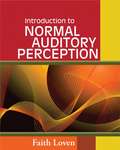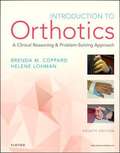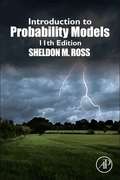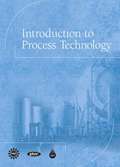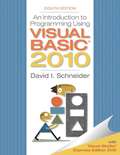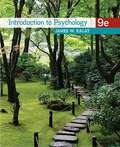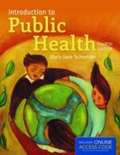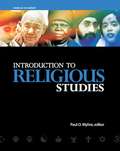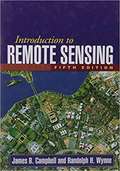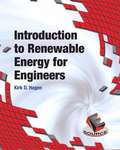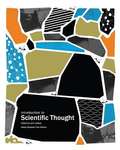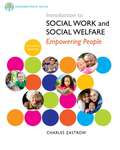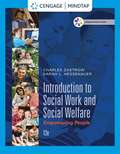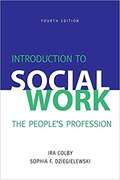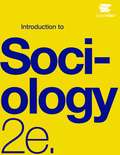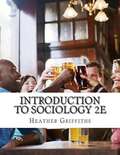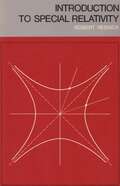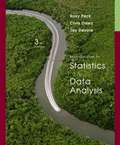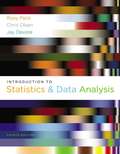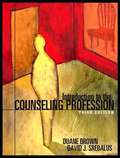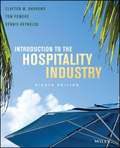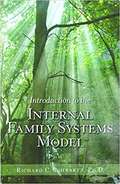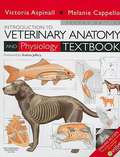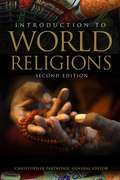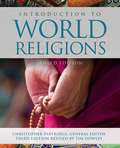- Table View
- List View
Introduction To Normal Auditory Perception
by Faith LovenTaking a classical approach to psychoacoutstics, Introduction to Normal Auditory Perception guides students toward a basic understanding of hearing science and theory. The book explores the germinal research published in the field of auditory perception and then clearly interprets the findings which have formed the foundations of modern auditory theory. Complex theories are broken down for easy comprehension. Starting with the basic principles of acoustics, the text moves through seminal experiments in psychoacoustics regarding the role of stimulus intensity, frequency, and duration on fundamental auditory perceptions. Basic principles of binaural listening are also covered.
Introduction To Orthotics: A Clinical Reasoning And Problem-solving Approach (Fourth Edition)
by Brenda M. Coppard Helene LohmanCovering the theory, design, and fabrication of orthotic devices, Introduction to Orthotics: A Clinical Reasoning & Problem-Solving Approach, 4th Edition helps you master the skills you need to choose and fit effective orthoses for patients with hand injuries and functional deficits. It emphasizes upper extremity splinting, with additional coverage of lower extremity orthotics and upper extremity prosthetics, and offers case studies promoting clinical reasoning and problem solving. This edition includes new chapters on orthotics of the shoulder and orthotic systems, plus online videos demonstrating fabrication and fitting techniques. Written by occupational therapy educators Brenda Coppard and Helene Lohman, this textbook/workbook is ideal for students and as a practical resource for occupational therapists and therapy assistants in the clinical setting.
Introduction To Probability Models
by Sheldon M. RossIntroduction to Probability Models, Tenth Edition, provides an introduction to elementary probability theory and stochastic processes. There are two approaches to the study of probability theory. One is heuristic and nonrigorous, and attempts to develop in students an intuitive feel for the subject that enables him or her to think probabilistically. The other approach attempts a rigorous development of probability by using the tools of measure theory. The first approach is employed in this text. The book begins by introducing basic concepts of probability theory, such as the random variable, conditional probability, and conditional expectation. This is followed by discussions of stochastic processes, including Markov chains and Poison processes. The remaining chapters cover queuing, reliability theory, Brownian motion, and simulation. Many examples are worked out throughout the text, along with exercises to be solved by students. This book will be particularly useful to those interested in learning how probability theory can be applied to the study of phenomena in fields such as engineering, computer science, management science, the physical and social sciences, and operations research. Ideally, this text would be used in a one-year course in probability models, or a one-semester course in introductory probability theory or a course in elementary stochastic processes.
Introduction To Process Technology
by Center For The Advancement Of Process TechnologyA 29 chapter textbook intended for use in high schools, community colleges, technical colleges, and universities which offer introductory process technology courses. Introduction to Process Technology provides the learner an overview of process technology. This text includes a variety of topics including, an overview of various process industries (oil and gas, chemical, mining, power generation, pulp and paper, water and waste water treatment, food and beverage, and pharmaceutical), basic chemistry, basic physics, safety, health, environment and security, quality, process drawings, and process equipment. Each chapter contains objectives, key terms, a summary, review questions and activities to enhance the learning experience. This text is appropriate for high schools, community colleges, technical colleges, and universities that offer introductory process technology courses.
Introduction To Programming Using Visual Basic 2010, 8th ed.
by David I. SchneiderAn Introduction to Programming Using Visual Basic 2010, Eighth Edition, -- consistently praised by both students and instructors -- is designed for students with no prior computer programming experience. Now updated for Visual Basic 2010, Schneider focuses on teaching problem-solving skills and sustainable programming skills. A broad range of real-world examples, section-ending exercises, case studies, and programming projects gives students more hands-on experience than any other Visual Basic book on the market.
Introduction To Psychology 9th Ed
by James W. KalatJames Kalat's best-selling INTRODUCTION TO PSYCHOLOGY does far more than cover major theories and studies; it encourages you to question the information and ask yourself, "How was this conclusion reached?" and "Does the evidence really support it?" In this student-praised text, Kalat challenges your preconceptions about psychology to help you become a more informed consumer of information not only during your college experience but also as you venture into your post-college life. With his humorous writing style and hands-on "Try It Yourself" exercises, Kalat puts you at ease and gets you involved with what you are studying so that you can succeed in your course.
Introduction To Public Health 4th Edition
by Mary-Jane SchneiderIntroduction to Public Health, Fourth Edition offers a thorough, accessible overview of the expanding field of public health for students new to its concepts and actors. Written in engaging, nontechnical language, this best-selling text explains in clear terms the multi-disciplinary strategies and methods used for measuring, assessing, and promoting public health. Packed with illustrative real-world examples, this updated edition provides students with informative discussions of the current technical issues and practical obstacles facing public health practitioners and policymakers alike. Through coverage of new approaches to research and data collection, current best practices in the field, and the social and ethical challenges of devising public policy, Introduction to Public Health, Fourth Edition provides readers with a broad-reaching, practical framework for understanding the multifaceted forces and organizations of today's public health enterprise.
Introduction To Religious Studies
by S. Brent Plate Jack Hill Darlene Fozard Weaver Bernadette McNary-Zak Paul Myhre Dianne Oliver David C. Ratke S. Brian Stratton A. K. M. Adam Swasti Bhattacharyya Daniel Deffenbaugh Kendra G. Hotz Karl Jacobson Debra MajeedFilling the need for a clear, solid overview to introduction to religious studies courses, this text is neither too broad nor too narrow. Chapters explore what religion is and how it is formed and studied; religious experience; truth claims; ethics and moral theology; violence and religion; social involvement; religion and the environment; asceticism and mysticism; religion, technology, and science; religions and their words, stories, writings, and books; and more. The text respects cultural considerations and the contemporary global climate in showing religious studies in action and exploring questions of theory, method, and research. The contributing authors are in tune with college students' interests and are well suited to address the issues and methods of religious studies. Designed for college students taking their first course in the study of religion, such as introduction to religious studies and world religions.
Introduction To Remote Sensing
by James B. Campbell Randolph H. WynneA leading text for undergraduate- and graduate-level courses, this book introduces widely used forms of remote sensing imagery and their applications in plant sciences, hydrology, earth sciences, and land use analysis. The text provides comprehensive coverage of principal topics and serves as a framework for organizing the vast amount of remote sensing information available on the Web. Including case studies and review questions, the book's four sections and 21 chapters are carefully designed as independent units that instructors can select from as needed for their courses. Illustrations include 29 color plates and over 400 black-and-white figures. New to This Edition *Reflects significant technological and methodological advances. *Chapter on aerial photography now emphasizes digital rather than analog systems. *Updated discussions of accuracy assessment, multitemporal change detection, and digital preprocessing. *Links to recommended online videos and tutorials.
Introduction To Renewable Energy For Engineers
by Kirk D. HagenIntroduction to Renewable Energy for Engineers is intended for beginning engineering students and students in other fields of study who want to learn the fundamental engineering principles of renewable energy. The primary focus of this book is the application of renewable energy to electrical power generation. As each renewable energy technology is explained, the student is shown how to do a basic energy analysis of the corresponding power-generation system. <p><p> Following an introductory chapter that covers the main types of renewable energy, the basics of energy and power calculations, and the fundamental economics of renewable energy systems, the book devotes a separate chapter to each renewable energy type: solar, wind, hydro, geothermal, marine, and biomass.
Introduction To Scientific Thought
by John OakesThis textbook is intended for use in a course on scientific thought. It includes a mixture of classic readings from the great figures in science and in the philosophy of science, as well as practical essays on scientific methodology, ethics and pseudoscience. Students will be introduced to the scientific world view: its sphere and limitations. <p><p> The book develops the methodology, epistemology, history and philosophy of science. It will give the student tools to reflect on the ethical implications of scientific discovery. In addition, the student will be trained in skepticism and critical thinking in order to distinguish pseudoscience from real science. The distinction between scientific and religious thought will be considered, as well as a discussion of the questions of interest to both.
Introduction To Social Work And Social Welfare
by Charles ZastrowThe bestselling introductory Social Work book on the market, Zastrow's INTRODUCTION TO SOCIAL WORK AND SOCIAL WELFARE: EMPOWERING PEOPLE, 11th Edition, is also lauded for being the most comprehensive. In addition to giving readers a thorough overview of the social work profession, this text offers a realistic view of social problems in contemporary society, equipping students with real-world insight that they can apply in practice. By presenting positive strategies in the context of the core values, ethics, skills, and knowledge base of today's professional social worker, Zastrow encourages readers to think critically about new, workable methods for problem-solving and empowering clients. Contemporary social problems case studies, exhibits, and tables help users apply concepts and compare and contrast issues. The Eleventh Edition has been thoroughly updated to include the latest NASW Standards, as well as new and emerging issues from the field. Packed with cutting-edge coverage and comprehensive CSWE core content, INTRODUCTION TO SOCIAL WORK AND SOCIAL WELFARE: EMPOWERING PEOPLE, 11th Edition, continues to inspire readers while giving them insight into real-world practice.
Introduction To Social Work And Social Welfare: Empowering People
by Charles ZastrowThe bestselling introductory Social Work text on the market, Zastrow's INTRODUCTION TO SOCIAL WORK AND SOCIAL WELFARE: EMPOWERING PEOPLE is lauded for being the most comprehensive and practical text available for beginning social workers. In addition to giving readers a thorough overview of the social work profession, this text offers a realistic view of social problems in contemporary society, equipping students with real-world insight that they can apply in practice. By presenting positive strategies in the context of the core values, ethics, skills, and knowledge base of today's professional social worker, Zastrow encourages students to think critically about new, workable methods for problem-solving and empowering clients. Case studies of contemporary social problems, exhibits, and tables help students apply concepts and compare and contrast issues. The twelfth edition has been thoroughly updated to align with the latest EPAS (2015) from CSWE, and offers insights into new and emerging issues from the field.
Introduction To Social Work: The People's Profession
by Ira Colby Sophia F. DziegielewskiThere are certain questions that all students considering social work ask. Who are social workers? What is it that social workers do? How is the social work profession changing? What does it take to become a social worker? Ira Colby and Sophia Dziegielewski bring their decades of experience in social work practice and education to answer these questions. This engaging text gives readers a practical guide to the many ways in which social workers effect change in their communities and the world. The authors offer an overview and history of the profession; introduce readers to the practice of social work at the micro, mezzo, and macro level; and finally look closely at the many settings and populations that social workers work with. While realistically portraying the pressures and obstacles that social workers face, Colby and Dziegielewski communicate their own passion for social work.
Introduction To Sociology
by Heather Griffiths Nathan Keirns Eric Strayer Susan Cody-Rydzewski Gail Scaramuzzo Sally Vyain Jeff Bry Faye Jones Tommy SadlerIntroduction to Sociology 2e adheres to the scope and sequence of a typical, one-semester introductory sociology course. It offers comprehensive coverage of core concepts, foundational scholars, and emerging theories, which are supported by a wealth of engaging learning materials. The textbook presents detailed section reviews with rich questions, discussions that help students apply their knowledge, and features that draw learners into the discipline in meaningful ways. The second edition retains the book's conceptual organization, aligning to most courses, and has been significantly updated to reflect the latest research and provide examples most relevant to today's students. In order to help instructors transition to the revised version, the 2e changes are described within the preface.
Introduction To Sociology (Second Edition)
by Heather Griffiths Nathan Keirns Eric Strayer Susan Cody-Rydzewski Gail Scaramuzzo Tommy Saddler Sally Vyain Jeff Bry Faye JonesIntroduction to Sociology 2e adheres to the scope and sequence of a typical, one-semester introductory sociology course. It offers comprehensive coverage of core concepts, foundational scholars, and emerging theories, which are supported by a wealth of engaging learning materials. The textbook presents detailed section reviews with rich questions, discussions that help students apply their knowledge, and features that draw learners into the discipline in meaningful ways. The second edition retains the book’s conceptual organization, aligning to most courses, and has been significantly updated to reflect the latest research and provide examples most relevant to today’s students. In order to help instructors transition to the revised version, the 2e changes are described within the preface.
Introduction To Special Relativity
by Robert ResnickThis book gives an excellent introduction to the theory of special relativity. Professor Resnick presents a fundamental and unified development of the subject with unusually clear discussions of the aspects that usually trouble beginners. He includes, for example, a section on the common sense of relativity. His presentation is lively and interspersed with historical, philosophical and special topics (such as the twin paradox) that will arouse and hold the reader's interest. You'll find many unique features that help you grasp the material, such as worked-out examples, summary tables, thought questions and a wealth of excellent problems. The emphasis throughout the book is physical.
Introduction To Statisitcs and Data Analysis
by Roxy Peck Chris Olsen Jay DevoreNIMAC-sourced textbook
Introduction To Statistics And Data Analysis
by Roxy Peck Chris Olsen Jay DevoreRoxy Peck, Chris Olsen, and Jay Devore's new edition uses real data and attention-grabbing examples to introduce students to the study of statistics and data analysis. Traditional in structure yet modern in approach, this text guides students through an intuition-based learning process that stresses interpretation and communication of statistical information. Simple notation--including the frequent substitution of words for symbols--helps students grasp concepts and cement their comprehension. Hands-on activities and interactive applets allow students to practice statistics firsthand. INTRODUCTION TO STATISTICS AND DATA ANALYSIS, 4th Edition, includes updated coverage of the graphing calculator as well as expanded coverage of probability.
Introduction To The Counseling Profession
by Duane Brown David J. SrebalusThe text is designed for use with beginning counselors-in-training who need a straightforward discussion of the history, strengths, limitations, theories, and techniques of the profession. The book includes chapter overviews, chapter summaries, and review questions to assist students in mastering material. Chapters read easily without overreferencing or the inclusion of esoteric material. Because of its size and breadth of overview, an instructor can use supplemental texts to bring emphasis to subjects of special interest.
Introduction To The Hospitality Industry
by Tom Powers Clayton W. Barrows Dennis ReynoldsIf any phrase characterizes the hospitality and tourism industry today it would probably be constantly changing.
Introduction To The Internal Family Systems Model
by Richard C. SchwartzInternal Family Systems Family Therapy is one of the fastest growing approaches to psychotherapy. It has developed over the past twenty years into a way of understanding and treating human problems that is empowering, effective, and nonpathologizing. IFS involves helping people heal by listening inside themselves in a new way to different “parts” -- feelings or thoughts – and, in the process, unburdening themselves of extreme beliefs, emotions, sensations, and urges that constrain their lives. As they unburden, people have no more access to Self, our most precious human resource, and are better able to lead their lives from that centered, confident, compassionate place. In these books, Richard Schwartz, the developer of the Internal Family Systems Model, introduces its basic concepts and methods in an engaging, understandable, and personal style. Therapists will find that the book deepens their appreciation of the IFS Model and helps their clients understand what they are experiencing in therapy. Also includes user-friendly exercises to facilitate learning. “One of the most innovative psychotherapeutic approaches to emerge in recent years.” - Froma Walsh, Ph.D
Introduction To Veterinary Anatomy And Physiology Textbook
by Victoria Aspinall Melanie CappelloA sound knowledge of anatomy and physiology is an essential basis for the effective clinical treatment of companion animals. The new Introduction to Veterinary Anatomy and Physiology Textbook builds on the success of the first edition in its thorough coverage of the common companion animal species. Updated throughout, the new edition features online learning resources, providing students with the opportunity to test their knowledge with questions and visual exercises, while instructors can download questions, figures and exercises to use as teaching aids. An essential first purchase for all those embarking upon a veterinary career Now with on-line resources including self-assessment tools and teaching aids Comprehensive coverage of all major companion animal species New equine chapter 'Applied Anatomy' tips relate theory to clinical practice, showing the relationship between anatomy and physiology and the disease process
Introduction To World Religions
by Christopher Partridge Tim DowleyA leading textbook for world religion, this new edition is designed to help students in their study and research of the world's religious traditions. Known and valued for its balanced approach and its respected board of consulting editors, this text addresses ways to study religion, provides broad coverage of diverse religions, and offers an arresting layout with rich illustrations. The second edition has new and extended primary source readings, a stronger section on the religions of South Asia, additional maps, a new full-color, student-friendly format, and more.
Introduction To World Religions
by Christopher Partridge Timothy DowleyThis leading textbook for world religion is designed to help students in their study and research of the world's religious traditions. Known and valued for its balanced approach and its respected board of consulting editors, this text addresses ways to study religion, provides broad coverage of diverse religions, and offers an arresting layout with rich illustrations. Introductory sections on understanding religion and the religions of antiquity lay the foundation for the study of the numerous religious traditions highlighted in the volume, including indigenous religions, Hinduism, Buddhism, Jainism, Judaism, Christianity, Islam, Sikhism, and Chinese, Korean, and Japanese religions. <p><p> The user-friendly content is enhanced by charts of religious festivals, historic timelines, updated maps of the world's religions, and a useful glossary. Both historical overviews and modern perspectives for each religion are included. This third edition has several updates, including a new design, a new section on women and religion, and a newly revised section on religions in today's world.
